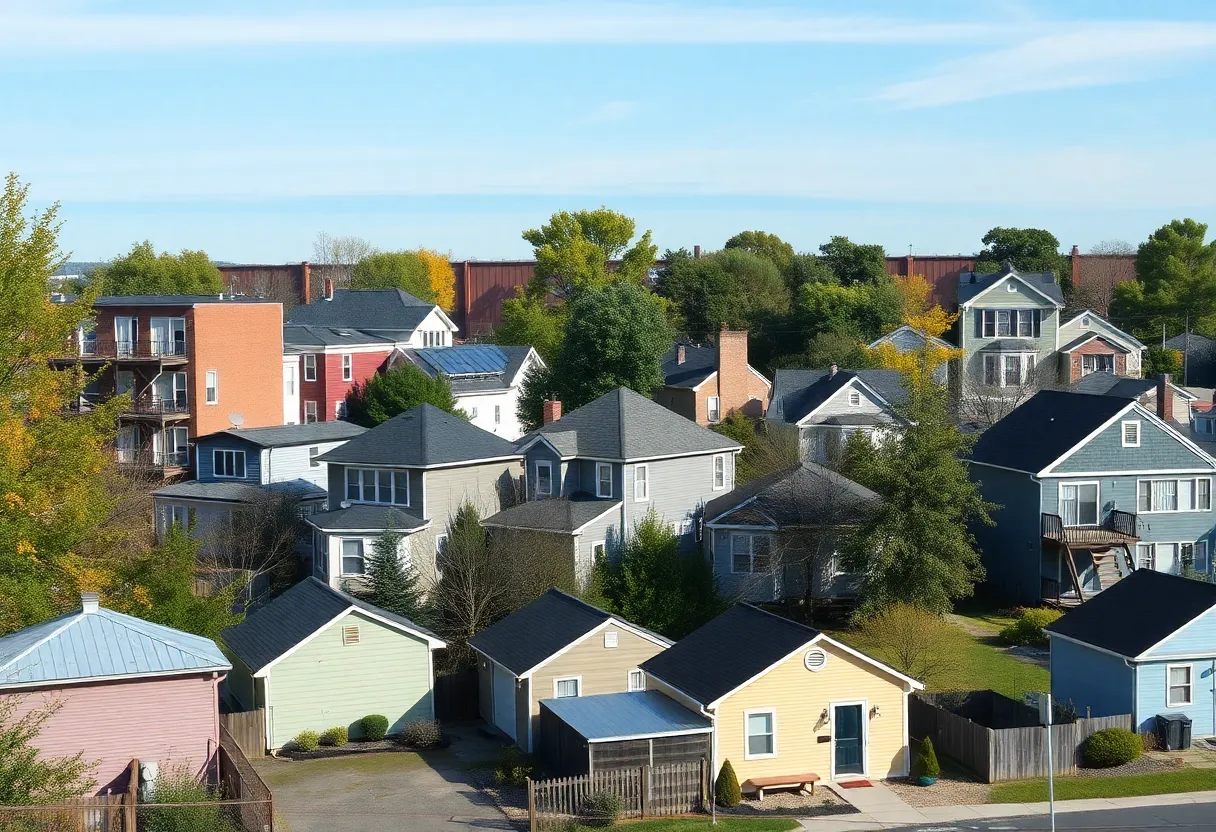Massachusetts, September 12, 2025
News Summary
Voters in Massachusetts could face a rent control ballot measure in 2026, as advocates begin gathering signatures after legal clearance. The proposal aims to limit annual rent increases to 5%, exempting small owner-occupied buildings and new constructions for ten years. Supporters argue it protects tenants from displacement, while opponents warn of negative impacts on housing supply. The City Council is divided on its formal support as the signature collection process unfolds in several cities this weekend.
Boston — Voters in Massachusetts could decide on a statewide rent control ballot measure in the fall of 2026, after advocates cleared an early legal hurdle and begin gathering signatures this weekend. The proposal faces a lengthy, costly signature drive and political debate, with Boston City Council members split over whether to formally support sending the question to voters.
Top-line developments
Attorney General Andrea Campbell has allowed the proposed ballot process to proceed, enabling organizers to seek roughly 75,000 verified signatures to place a rent control question on the 2026 ballot. Signature collection events are scheduled to begin this weekend in Springfield, Worcester, Lynn, and Boston. Advocates say the measure would allow annual rent increases tied to the cost of living, capped at 5%, while exempting owner-occupied buildings with four or fewer units and newly constructed buildings during their first ten years.
City Council action and local politics
Boston City Councilors debated a resolution filed by Councilor Henry Santana urging support for the rent control ballot question, citing concerns about displacement and housing insecurity. Discussion on the resolution was cut short after Councilor Ed Flynn objected and called for a public hearing before further action. Several councilors voiced support for reinstating rent control, and at least one councilor cited the recent ban on renter-paid broker’s fees as evidence of incremental progress on tenant protections.
What the proposal would do
The measure put forward by advocates aims to limit rent increases through a formula tying annual adjustments to the cost of living, with a proposed cap of 5% per year. Exemptions in the plan would include small owner-occupied properties with up to four units and newly constructed buildings for the first ten years after completion. Supporters frame the proposal as a tool to prevent displacement and maintain affordable housing for long-term residents.
Practical hurdles and opposition
Organizers must collect and verify approximately 75,000 signatures, a process described by campaign planners as time-consuming and expensive. The real estate industry and other opponents argue that rent control can reduce housing production and ultimately increase costs for renters by discouraging new construction. Some local officials pointed to the experience of St. Paul, Minnesota, where a rent control ordinance was followed by a decline in housing construction after its 2022 implementation, as a cautionary example.
Earlier attempts and legal background
Massachusetts effectively banned rent control statewide in 1994. Since then, there have been multiple attempts to revisit or overturn the ban. Former local efforts included a plan introduced by Boston’s mayor that sought to exempt the city from the state prohibition; that effort stalled in the State House. A past attempt by a state representative to put a repeal measure on the ballot did not secure sufficient backing. The current process is proceeding after the state Attorney General cleared initial legal review.
Community response and on-the-ground activity
Advocacy groups launched a signature campaign kickoff rally in Somerville and report that tenants across the region are increasingly worried about rent hikes and displacement. Organizers describe recent incidents of aggressive rent increases by corporate landlords that have led some tenants to withhold rent and pursue legal action. Campaigners say the ballot question represents a critical step to restore local tools to address housing insecurity if the state ban remains in place.
Next steps and timeline
With the Attorney General’s clearance, organizers must now complete the signature-gathering phase and submit petitions for validation. If they gather the required signatures and meet legal standards for the initiative, the question could appear on the statewide ballot in fall 2026. Meanwhile, City Councilors in Boston may hold hearings to explore municipal positions, and state lawmakers could still weigh in through separate legislative channels.
Why it matters
The debate over rent control in Massachusetts ties into broader concerns about housing affordability, tenant protections, and the balance between encouraging housing construction and protecting long-term residents from displacement. The outcome of signature drives, municipal debates, and potential voter approval could reshape local housing policy and influence how cities and towns manage rent regulation in the years ahead.
FAQ
What is the proposed measure?
The proposal would allow annual rent increases tied to the cost of living with a cap of 5%, while exempting owner-occupied buildings with four or fewer units and newly constructed buildings during their first ten years.
When could the measure appear on the ballot?
If organizers collect enough valid signatures and meet legal requirements, the question could appear on the statewide ballot in the fall of 2026.
How many signatures are required?
Advocates need to collect roughly 75,000 verified signatures to qualify the measure for the ballot.
Where are signature events taking place?
Signature collection events are scheduled to start this weekend in Springfield, Worcester, Lynn, and Boston.
Who supports and who opposes the measure?
Tenant and housing advocacy groups support the measure as a way to prevent displacement and curb steep rent hikes. The real estate industry and other opponents argue rent control can limit new construction and lead to higher costs or reduced housing supply.
What legal or historical context is relevant?
Rent control has been effectively banned across Massachusetts since 1994. Past efforts to exempt cities or repeal the ban have not succeeded in the State House or through prior ballot efforts.
Quick reference table
| Item | Details |
|---|---|
| Potential ballot date | Fall 2026 |
| Required signatures | Approximately 75,000 verified signatures |
| Planned signature event cities | Springfield, Worcester, Lynn, Boston |
| Proposed annual cap | 5% (tied to cost of living) |
| Exemptions | Owner-occupied buildings with ≤4 units; newly constructed buildings for first 10 years |
| Legal status | Statewide rent control effectively banned since 1994; ballot process cleared to proceed by Attorney General |
| Local government action | Boston City Council debated a supporting resolution; further discussion blocked pending a public hearing |
| Main arguments for | Prevent displacement, limit steep rent hikes, protect housing stability |
| Main arguments against | May deter new construction and reduce housing supply, potential unintended cost impacts |
Deeper Dive: News & Info About This Topic
HERE Resources
Michelle Wu Dominates Boston Mayoral Preliminary Election
Massachusetts Rent Control Ballot Measure Advances
Nantucket Whalers Achieve First Golf Victory of the Season
Massachusetts Legislators Consider Data Privacy Bills
Skanska Partners with Simmons University for Mixed-Use Development
Massachusetts Initiative Aims to Repeal Cannabis Legalization
Massachusetts Rent Control Initiative Gains Momentum
Massachusetts Implements New Privacy Regulations for Businesses
Thailand’s Political Landscape Changes with New Prime Minister
Boston Addresses Safety and Homelessness at Mass. and Cass
Additional Resources
- Boston.com: Boston City Council Shows Mixed Support for Rent Control Ballot Question
- Wikipedia: Rent control
- Boston Globe: Boston Rent Control
- Google Search: Rent control
- NBC Boston: Rent Control Supporters Rally in Somerville
- Google Scholar: Rent control Massachusetts
- MassLive: Rent Control is a Terrible Idea, Says Greater Boston Chamber Boss
- Encyclopedia Britannica: Rent control
- Bay State Banner: New Rent Control Legislation Aims at Drastic Increases

Author: STAFF HERE BOSTON WRITER
The BOSTON STAFF WRITER represents the experienced team at HEREBoston.com, your go-to source for actionable local news and information in Boston, Suffolk County, and beyond. Specializing in "news you can use," we cover essential topics like product reviews for personal and business needs, local business directories, politics, real estate trends, neighborhood insights, and state news affecting the area—with deep expertise drawn from years of dedicated reporting and strong community input, including local press releases and business updates. We deliver top reporting on high-value events such as Boston Marathon, Head of the Charles Regatta, and Boston Harborfest. Our coverage extends to key organizations like the Greater Boston Chamber of Commerce and Associated Industries of Massachusetts, plus leading businesses in finance, biotech, and insurance that power the local economy such as Fidelity Investments, Biogen, and Liberty Mutual Insurance. As part of the broader HERE network, we provide comprehensive, credible insights into Massachusetts's dynamic landscape.





